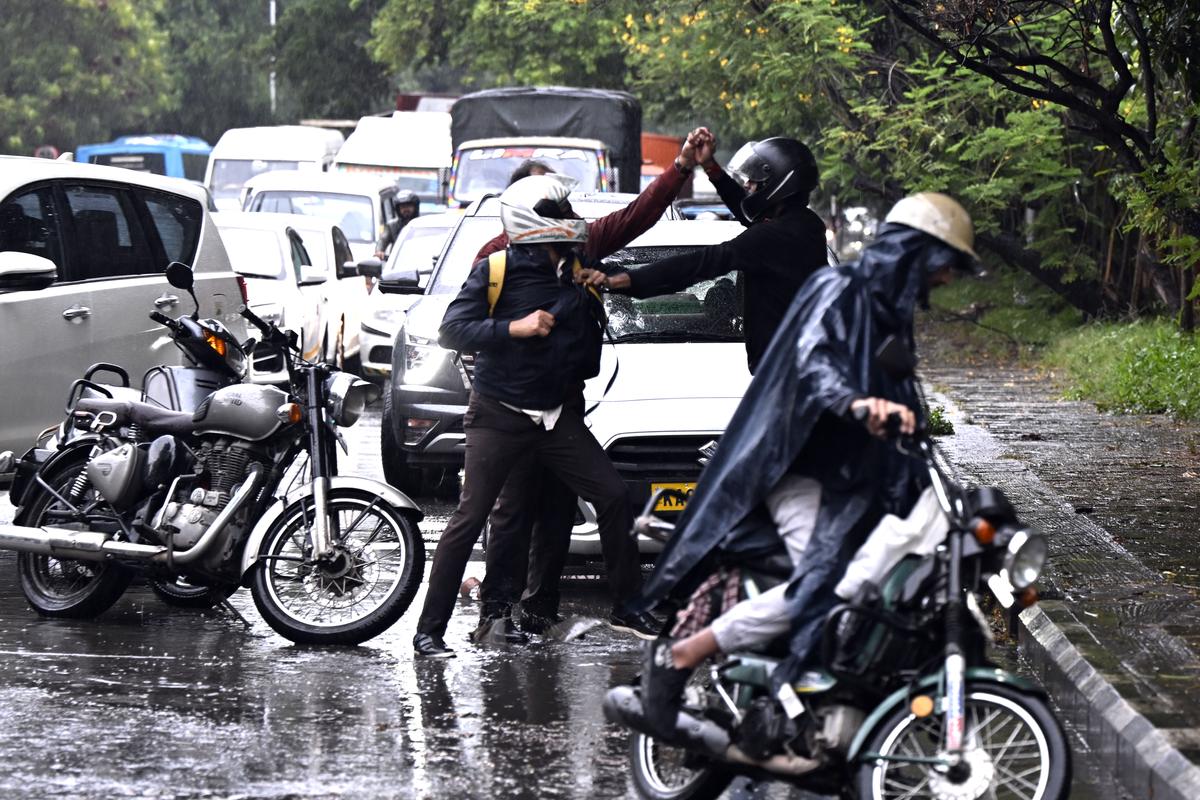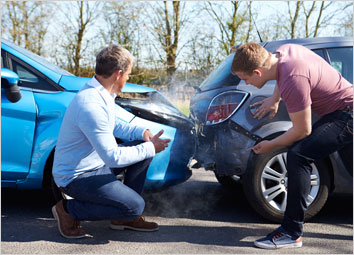The long wait for closure has finally come to an end as a court convicted two men for murdering a private firm employee in a brutal road-rage incident that occurred seven years ago. The judgment has brought a wave of mixed emotions — grief, relief, and a renewed sense of trust in the justice system. The tragic case, which lingered in public memory, highlights the rising threat of impulsive violence on urban roads and reinforces the need for stricter deterrents against road rage. Families of the victim expressed sorrow over the delay but relief that justice was ultimately served.
The incident dates back seven years, when what began as a minor roadside altercation escalated into a violent attack. The victim, a 28-year-old employee of a private company, was returning home from work when his motorbike allegedly brushed against a vehicle belonging to the accused. An argument broke out between the sides, and within moments, the confrontation spiralled into assault. The attack led to fatal injuries, resulting in the victim’s death soon after. His family, devastated by the sudden loss, has been fighting for justice ever since.
For years, the judicial process crawled forward, weighed down by procedural delays, witness inconsistencies, and multiple appeals. Despite these hurdles, the prosecution eventually managed to establish guilt through corroborated testimonies, technical evidence, and medical reports. The court held the two accused responsible for intentional assault leading to death. The victim’s family, who attended court sessions relentlessly, expressed bittersweet relief — justice has arrived, but their son will never return. Their grief serves as a reminder of how road rage leaves emotional scars that no conviction can ever heal.
The case sheds light on India’s growing road-rage culture. Urban roads have become zones of unpredictable aggression, where minor gestures are often interpreted as provocation. Psychologists say rising stress, poor traffic discipline, and lack of emotional regulation are key triggers. This incident, though not the first, stands as an example of how trivial disagreements can escalate into irreversible tragedy. Experts argue that stronger preventive measures must be implemented, including stricter enforcement, awareness campaigns, and anger-management interventions. The conviction marks one legal victory but underscores the larger issue of road safety.


How the Case Progressed Over 7 Painful Years
The journey to conviction was long and arduous. Initially, police arrested the suspects within days of the incident, based on eyewitness accounts and CCTV visuals from nearby establishments. However, the case soon encountered complications. Key witnesses were reluctant to testify, fearing retaliation. Several hearings were postponed due to procedural issues. For the grieving family, each delay felt like reopening the wound. Their perseverance became central in keeping the momentum alive, ensuring the case did not fade with time.
During trial, the prosecution presented medical reports detailing the injuries inflicted upon the victim, establishing a clear link between the assault and the death. The defense attempted to argue that the altercation was unplanned and that intoxication played a role, claiming it was a case of accidental harm rather than intentional violence. However, the court rejected these claims after evaluating the severity of the injuries and the manner of attack. The judgment stated that the accused acted with clear aggression that resulted in fatal consequences.
Witness testimonies were critical. Several bystanders who had observed the confrontation came forward to confirm that the victim had not provoked the accused. One witness recalled how the attackers dragged the victim from his bike and beat him mercilessly. Another recounted desperate attempts by onlookers to intervene, but they were threatened. These statements significantly strengthened the prosecution’s case. In addition, CCTV footage placed the accused at the scene, supporting eyewitness claims and closing potential loopholes in the defense narrative.
Throughout the proceedings, the victim’s family shared how their lives had been shattered. The victim had been the primary breadwinner, and his parents struggled emotionally and financially. After his death, his mother reportedly suffered psychological trauma and required extensive treatment. The family’s lawyer highlighted these effects during the sentencing argument, urging the court to consider the long-term suffering inflicted upon them. Their loss, he argued, was not only emotional but also socio-economic — a painful burden they continued to carry.
The court’s decision came after careful assessment of all testimonies and evidence. In its order, the judge emphasised the gravity of the crime and the need to send a strong message against road violence. Both accused were convicted under relevant sections of the IPC related to culpable homicide not amounting to murder, along with assault. Sentencing is expected to take place in the coming days and may include significant jail time. Legal experts predict that the punishment could serve as a landmark, encouraging stricter punitive action for similar offences.
The verdict has generated public conversation about justice delays in India. While the conviction brings closure, many believe seven years is too long for a straightforward road-rage murder case. Advocates suggest that special fast-track procedures must be introduced for violent crimes arising from traffic disputes. They argue that delayed justice weakens public trust and prolongs suffering for families. Courts, however, continue to be burdened by heavy caseloads, shortage of judicial staff, and slow investigative processes — challenges that contribute to prolonged trials.
Road-rage cases have become alarmingly common. In recent years, several cities have reported fatal confrontations over trivial issues like overtaking, honking, or accidental contact between vehicles. Experts argue that rising urban stress, lack of awareness regarding legal consequences, and insufficient traffic regulation collectively fuel such incidents. They emphasise the need to treat road-rage as a serious criminal issue rather than a traffic matter. Public campaigns focusing on emotional regulation and traffic discipline could play a significant role in reducing aggression.

Families React, Experts Speak, and Larger Lessons for Society
The victim’s family expressed relief that the trial had concluded but said the judgment could not replace what they lost. The victim’s father told reporters that he still wakes up thinking about his son’s final moments. He said the family’s only motive in pursuing the case was to ensure no other family endures similar trauma. While they feel justice has been served, the absence of their loved one remains a permanent void. Their resilience throughout the ordeal has been honoured by activists and legal communities.
Legal experts believe the conviction is an important precedent. It reaffirms that road-rage incidents will not be treated lightly and that perpetrators will be held accountable. Some advocates have called for harsher sentences in such cases, arguing that fear of punishment may deter impulsive violence. They also recommend mandatory anger-management workshops for repeated traffic offenders. The tragedy highlights how an emotionally charged moment on the road can lead to irreversible consequences — a lesson society must absorb deeply.
Psychologists describe road rage as a symptom of broader social frustration. Rapid urbanisation, traffic congestion, noise pollution, and demanding work environments contribute to elevated stress levels. These factors, combined with impatience and lack of civic discipline, create a volatile traffic environment. Experts suggest that building emotional intelligence should be central to driver training. Public policies promoting mental well-being and awareness about consequences of aggressive driving can help prevent such incidents.
The responsibility for prevention lies not only with individuals but also with institutions. Law-enforcement agencies must adopt proactive measures, including higher penalties, regular patrolling, and faster grievance redress. The transport department could introduce awareness modules about road rage in driving tests. Schools and colleges can incorporate lessons on traffic sensitivity and conflict de-escalation. Urban planners advocate for better infrastructure, arguing that smoother traffic flow can reduce stress on roads. These multifaceted approaches can help control negative behaviours.
Public response to the conviction has been largely empathetic. Many people have expressed solidarity with the victim’s family while also voicing frustration over the length of the trial. On social media, several users pointed out that similar cases continue to occur, demanding stronger systemic reforms. The judgment, they believe, should serve as a warning to those who resort to violence on the road. Citizens stressed that mutual respect among drivers, patience, and emotional restraint must be promoted as essential traffic values.
The incident also highlights the need for improved safety mechanisms on roadways. Installing more CCTV units, deploying mobile patrol units, and encouraging public reporting can deter violent behaviour. Community groups believe that collaboration between civil society, police, and local authorities could help reduce conflict. Awareness campaigns at public transport hubs, educational institutions, and corporate campuses can help spread preventive messages. Families who have experienced such tragedies have offered to contribute to awareness drives, hoping their stories can save others.

While the conviction has brought legal closure, the wound remains deep. Stories like these might encourage introspection about the fragility of life and the importance of emotional control in stressful situations. In the end, every driver carries the responsibility of preserving safety — their own and that of others. A few seconds of anger can destroy lives. For the victim’s family, this single truth has reshaped their world forever. Their hope is that society will learn from their loss and prioritise compassion over confrontation.
In the courtroom, as the verdict was read, the victim’s parents held each other tightly. Their tears reflected both sorrow and relief. For them, justice has been a long road — full of uncertainty, anxiety, and heartbreak. They now hope that sentencing will reflect the severity of their suffering and the brutality of the attack. Their lawyer shared that they will continue monitoring the sentencing process, determined to see the matter through to the end.
Road-rage incidents may occur in moments, but their aftermath lasts for generations. This case is a somber reminder that cities must cultivate patience and empathy on the road. As vehicles multiply and urban spaces tighten, conflicts will intensify unless emotional awareness is prioritised. The conviction offers a moral lesson — violence is never justified, especially over trivial disagreements. It urges communities to treat road spaces as shared environments rather than battlegrounds of ego.
Conclusion
Seven years after a fatal altercation cut short a young life, justice has finally prevailed, convicting two individuals responsible for the murder. While it cannot erase the family’s grief, the verdict validates their perseverance and reassures society that accountability is possible, even after long delays. The tragedy underscores the dangers of unchecked aggression on the road, pushing for reforms in traffic awareness, psychological education, and legal enforcement. As Bengaluru — and India at large — grapples with rising road rage, this case stands as a powerful reminder: a single moment of fury can destroy entire futures, but justice, though delayed, can still provide healing.
Follow: Karnataka Government
Also read: Home | Channel 6 Network – Latest News, Breaking Updates: Politics, Business, Tech & More

